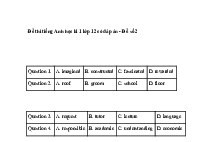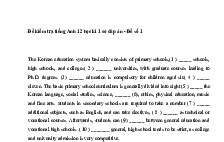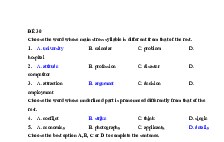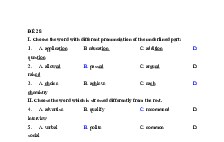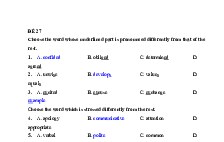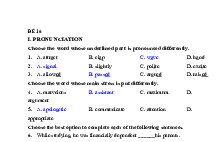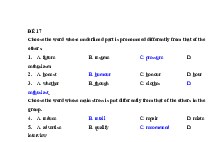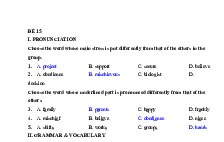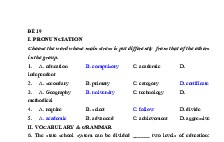Đề KSCL thi Tốt nghiệp THPT môn Tiếng Anh năm 2023 Mã đề 067
Nội dung tài liệu
Tải xuốngCác tài liệu liên quan
-
![Đề thi học kì 1 Tiếng anh lớp 12 năm 2020-2021 ĐỀ SỐ 2]()
-
![Đề thi học kì 1 Tiếng anh lớp 12 năm 2020-2021 ĐỀ SỐ 1]()
-
![Đề thi học kì 1 Tiếng anh lớp 12 năm 2020-2021 ĐỀ SỐ 30]()
-
![Đề thi học kì 1 Tiếng anh lớp 12 năm 2020-2021 ĐỀ SỐ 28]()
-
![Đề thi học kì 1 Tiếng anh lớp 12 năm 2020-2021 ĐỀ SỐ 27]()
-
![Đề thi học kì 1 Tiếng anh lớp 12 năm 2020-2021 ĐỀ SỐ 29]()
-
![Đề thi học kì 1 Tiếng anh lớp 12 năm 2020-2021 ĐỀ SỐ 16]()
-
![Đề thi học kì 1 Tiếng anh lớp 12 năm 2020-2021 ĐỀ SỐ 17]()
-
![Đề thi học kì 1 Tiếng anh lớp 12 năm 2020-2021 ĐỀ SỐ 15]()
-
![Đề thi học kì 1 Tiếng anh lớp 12 năm 2020-2021 ĐỀ SỐ 14]()
Có thể bạn quan tâm
Thông tin tài liệu
SỞ GD&ĐT………… TRƯỜNG THPT ………… (Đề thi gồm 04 trang) |
KÌ THI TỐT NGHIỆP TRUNG HỌC PHỔ THÔNG NĂM 2023 Bài thi: NGOẠI NGỮ; Môn thi: TIẾNG ANH 067 Thời gian làm bài. 60 phút, không kể thời gian phát đề |
|---|
Họ và tên thí sinh:……………………………………………………………………. SBD:…………………………
Mark the letter A, B, C, or D to indicate the word whose underlined part differs from the other three in pronunciation in each of the following questions.
Question 01. A. attained B. resolved C. disused D. decreased
Question 02. A. dream B. mean C. peace D. steady
Mark the letter A, B, C, or D to indicate the word that differs from the other three in the position of the primary stress in each of the following questions.
Question 03. A. career B. prospect C. effort D. labour
Question 04. A. obedient B. decision C. dedicate D. biologist
Mark the letter A, B, C, or D on your answer sheet to indicate the correct answer to each of the following questions.
Question 05. It is impossible for him to be financially independent at such an early age, ______?
A. isn't it B. is it C. doesn't he D. does he
Question 06. We can’t go along here because the road ______.
A. is repairing B. is repaired C. is being repaired D. repairs
Question 07. He harbors a deep resentment ______ his parents for his miserable childhood.
A. on B. from C. for D. against
Question 08. The more manufacturers advise, ______ they sell.
A. the most products B. the products more C. the more products D. most products
Question 09. Her husband bought her a ______ scarf when he went on holiday in Singapore last week.
A. beautiful silk red B. beautiful red silk C. red silk beautiful D. silk red beautiful
Question 10. He had a bad fall while he ______ his roof.
A. was repairing B. repaired C. repairs D. will repair
Question 11. The new supermarket is so much cheaper than the one in John Street. ______, they do free home deliveries.
A. Moreover B. Consequently C. Nevertheless D. Instead
Question 12. By the time the software goes on sale next month, the company ______ $2 million on developing it.
A. had spent B. has spent C. will spend D. will have spent
Question 13. ______ the age of 21, he was able to gamble in Las Vegas.
A. When reached B. Reached C. As reaching D. Upon reaching
Question 14. No one can predict the future exactly. Things may happen ______.
A. expected B. unexpectedly C. unexpected D. expectedly
Question 15. I try to be friendly but it is hard to ______ some of my colleagues.
A. get on with B. watch out for C. come up with D. stand in for
Question 16. His honesty is ______; nodiv can doubt it.
A. in question B. without question C. out the question D. beside the question
Question 17. People feel it is time Ministers put their ______ on the table regarding their long-term plans.
A. cards B. hands C. feet D. papers
Question 18. We decided to ______ in Athens for a few days on our way home.
A. stop over B. put up C. close down D. set up
Question 19. Does television adequately reflect the ethnic and cultural _______ of the country.
A. custom B. diversity C. alternation D. minority
Mark the letter A, B, C or D to indicate the word(s) CLOSEST in meaning to the underlined word(s) in each of the following questions.
Question 20. It is firmly believed that books are a primary means for disseminating knowledge and information.
A. inventing B. distributing C. classifying D. adapting
Question 21. The amount spent on defense is in sharp contrast to that spent on housing and health.
A. blare B. flask C. stark D. spark
Mark the letter A, B, C or D to indicate the word(s) OPPOSITE in meaning to the underlined word(s) in each of the following questions.
Question 22. Today, illegal hunting still threatens many species, especially large mammals such as tigers, rhinoceros, bears and even primates.
A. allowed by law B. forbidden by law C. introducing a law D. imposing a law
Question 23. Tom was too wet behind the ears to be in charge of such a difficult task.
A. full of experience B. without money C. full of sincerity D. lack of responsibility
Mark the letter A, B, C, or D to indicate the sentence that best completes each of the following exchanges.
Question 24. Two friends Diana and Anne are talking about their upcoming exams.
- Diana: “Our midterm exams will start next Tuesday, are you ready?”
- Anne: “_______”.
A. I’m half ready. B. God save you. C. Thank you so much D. Don’t mention it!
Question 25. Two neighbors are talking to each other about their work.
- Sanji: "I'm taking a break from my gardening. There seems to be no end to the amount of work I have to do." - Nico: “_______”
A. I do, too. B. Not at all
C. I'm glad I'm not in your shoes. D. There's no doubt about that.
Read the following passage and mark the letter A, B, C, or D to indicate the correct word or phrase that best fits each the numbered blanks.
In an educational context, the term ‘learner independence’ has gained increasing importance in recent years. It is of particular (26) ______ to language learning and commonly refers to the way students confidently control and organise their own language learning process. While some people seem to have an almost instinctive flaw for languages, (27) ______ have to rely on strategies to maximise their skills and learn a foreign language more effectively.
The main thing to remember is that becoming a truly independent learner ultimately depends above all on taking responsibility for your own learning and being prepared to take every opportunity available to you to learn. You also increase your chances of (28) ______ by learning according to your own needs and interests, using all available resources. Research shows that learners (29) ______ adopt this approach will undoubtedly manage to broaden their language abilities considerably and, (30) ______, are most likely to achieve their objectives in the longer term.
(Adapted from “Complete Advanced” by Laura Mathews and Barbara Thomas)
Question 26. A. acceptance B. relevance C. acquaintance D. resemblance
Question 27. A. each B. every C. others D. Few
Question 28. A. interest B. failure C. suspicion D. success
Question 29. A. who B. why C. which D. where
Question 30. A. though B. as a result C. because D. in contrast
Read the following passage and mark the letter A, B, C, or D on your answer sheet to indicate the correct answer to each of the questions.
Movements and gestures by the hands, arms, legs, and other parts' of the div and face are the most pervasive types of nonverbal messages and the most difficult to control. It is estimated that there are over 200.000 physical signs capable of stimulating meaning in another person. For example, there are 23 distinct eyebrow movements, each capable of stimulating a different meaning.
Humans express attitudes toward themselves and vividly through div movements and postures. Body movements express true messages about feelings that cannot be masked. Because such avenues of communication are visual, they travel much farther than spoken words and are unaffected by the presence of noise that interrupt, or cancels out speech.
People communicate by the way they walk, stand, and sit. We tend to be more relaxed with friends or when addressing those of lower status. Body orientation also indicates status or liking of the other individual. More direct orientation is related to a more positive attitude.
Body movements and postures alone have no exact meaning, but they can greatly support or reject the spoken word. If these two means of communication are dichotomized and contradict each other, some result will be a disordered image and most often the nonverbal will dominate.
Question 31. Which part of div is NOT used to send div message?
A. stomachs B. legs C. hands D. faces
Question 32. Body communication is ______.
A. uncommon B. verbal C. very few D. visual
Question 33. Nonverbal communication ______.
A. dominates words B. has no relation to verbal communication
C. may be interrupted by noise D. is less common than verbal communication
Question 34. According to the text, div movements cannot express ______.
A. desires B. feelings C. attitudes D. status
Question 35. Face gestures ______.
A. do not include eye brow moments B. cannot express our feelings
C. are the most difficult to control D. can help us control our feelings
Read the following passage and mark the letter A, B, C, or D on your answer sheet to indicate the correct answer to each of the questions.
Charles Dickens was born in Land-sport, a small town near the sea, in a middle-class family. In 1814 the family moved to London. His father was a clerk in a navy office; he got a small salary there and usually spent more than he earned. As a result of this he was thrown into the debtors' prison when Charles was only ten. At that age the boy went to work at a factory which was like a dark, damp cellar. There he stuck labels on bottles of shoe-blacking all day long, for a few pennies.
Later he went to school which he attended for only three years and at the age of 15 he started his work in a lawyer's office. He continued to educate himself, mainly by reading books. At 18 he became a reporter in Parliament. There he got acquainted with politics and never had a high opinion of them afterwards.
In 1833 he began to write his first short stories about London life. In 1836 those stories were published as a book, under the title of Sketches by Boz; Boz was the penname with which he signed his first work.
In 1837 Dickens became well-known to the English readers. His first big work appeared, written in instalments for a magazine at first, and later published in book form. It was The Posthumous Papers of the Pickwick Club. From then on Dickens was one of the best known and loved writers of his day.
Dickens literary heritage is of world importance. He developed the English social novel, writing about the most burning social problems of his time. He created a wide gallery of pictures of bourgeois society and its representative types which still exist in England; he wrote of the workhouses of England and the tragedy of the children who lived in them (Oliver Twist); he wrote about the problem of education and showed how it handicapped children (Nicholas Nickleby).
Question 36. What does this passage mainly discuss?
A. Dickens’s father’s debt and its consequences.
B. Dickens’ life and its influence on his work.
C. Charles Dickens’ life and works. D. Dickens’ works and writing styles.
Question 37. According to the passage, all of the following statements are true EXCEPT that ______.
A. Dickens’s father worked on the sea B. Dickens’s father was sent into prison
C. Dickens went to work very early D. When Dickens was small, he earned little money
Question 38. We can infer from the passage that the factory where Dickens worked was ______.
A. near his house B. quite wet C. very small D. in a big building
Question 39. The word “them” in paragraph 1 refers to ______.
A. books B. lawyers C. reporters D. politics
Question 40. The word “work” in paragraph 3 is closest in meaning to ______.
A. heading B. pen-name C. nick name D. family name
Question 41. The word “title” in paragraph 2 is closest in meaning to ______.
A. job B. novelist C. office D. story
Question 42. It can be inferred from the passage that Dickens became famous through ______.
A. a magazine B. a newspaper C. a publisher D. words of mouth
Mark the letter A, B, C or D to indicate the underlined part that needs correction in each of the following questions.
Question 43. Mr. Carlos, along by his cousins from Mexico City, is planning to attend the festivities.
A. by B. from C. to attend D. is
Question 44. In spite of their frightening appearance, the squid is shy and completely harmless. A. In spite of B. frightening C. harmless D. their
Question 02. Do you think you could lend me good pair of gloves to wear to the wedding?
A. to swear B. good pair C. could D. gloves
Mark the letter A, B, C, or D to indicate the sentence that is closest in meaning to each of the following questions.
Question 46. We started working here three years ago.
A. We worked here for three years. B. We have no longer worked here for 3 years.
C. We have worked here for three years. D. We will work here in three years.
Question 47. “My father doesn’t work in the factory any more” Bella told us.
A. Bella said that her father no longer worked in the factory.
B. Bella wished that her father didn’t work in the factory any more.
C. Bella hoped that her father was used to working in the factory
D. Bella denied that her father used to work in the factory.
Question 48. I’m sure that they had practiced hard for the games as they won a lot of medals.
A. They couldn’t have practiced hard for the games as they won a lot of medals
B. They must have practiced hard for the games as they won a lot of medals
C. They shouldn’t have practiced hard for the games as they won a lot of medals
D. They might have practiced hard for the games as they won a lot of medals.
Mark the letter A, B, C, or D to indicate the sentence that best combines each pair of sentences in the following questions.
Question 49. Lan didn't apply for the job in the library and regrets it now.
A. Lan wishes she had applied for the job in the library.
B. Lan wishes she have applied for the job in the library.
C. Lan wishes she has applied for the job in the library.
D. Lan wishes she applies for the job in the library.
Question 50. Helen wrote a novel. He made a cowboy film, too.
A. Helen wrote not only a novel but also made a cowboy film.
B. Helen both wrote a novel as well as made a cowboy film.
C. Helen either wrote a novel or made a cowboy film.
D. Not only did Helen write a novel but she also made a cowboy film.
_____HẾT_____


